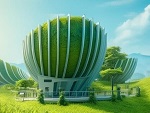The ecological bioeconomy, conceptualized by Nicholas Georgescu-Roegen in the 1970s, proposes a fundamental rethinking of the relationship between the economic system and the biophysical limits of the planet (Debref, Vivien, 2021; Georgescu-Roegen, 1975, 1984). His work called for a shift toward resource cycles based on organic materials, an idea that continues to fuel debates in social-ecological economics. Recent research highlights the persistence of competing and complementary visions of the bioeconomy, shaping diverse innovation dynamics and influencing the resilience of agricultural models (Grouiez et al., 2023; Vivien et al., 2019). This diversity extends to agricultural systems, which play a central role in supporting these various trajectories. Among these models, the rise of energy farming model—where biomass is cultivated for green energy production. This approach is largely driven by anaerobic digestion technology, known as agricultural methanization, which has become a strategic investment for farms. By adopting this model, farmers navigate the intersection of two socio-technical regimes: agriculture and energy. Agricultural methanization stands out therefore as a transformative mechanism, positioning farmers not only as food producers but also as key players in renewable energy production, in alignment with French public policy objectives (Berthe et al., 2022). However, the extent to which this model accounts for the biophysical limits of the biosphere remains a subject of debate (Dziebowski et al., 2023).
Our research explores the energy farming model, its issues, and its dissemination in the Grand Est region, recognized as a leader in France. Using a combination of heterogeneous data collected from this territory and an exploratory study based on both quantitative and qualitative methods, we adopt an evolutionary approach inspired by the social ecological economics to analyse the diffusion of agricultural methanization from the early 2000s to the present.
Our findings reveal that the energy farming model has given rise to three distinct business models along a broad spectrum. At one end, a highly productivist approach is characterized by the externalization of transformation processes, while at the other, more integrated models align with the biophysical limits of the biosphere. We demonstrate how the expansion of agricultural methanization reflects diverse business strategies, shaped by farmers' relationship with biomass, its uses, and their perception of renewable energy production in agriculture. These contrasting models highlight different ways of integrating environmental constraints and redefining the relationship between agriculture and nature, contributing to either an ecological or a non-ecological bioeconomy.
References
BERTHE, A., GROUIEZ, P., FAUTRAS, M., (2022), Heterogeneity of Agricultural Biogas Plants in France: A Sectoral System of Innovation Perspective, Journal of Innovation Economics Management, Im‑24.
DEBREF, R., VIVIEN, F.-D., (2021), Quelle bioéconomie ? Les enseignements d'une controverse en France à la fin des années 1970, Economie rurale, (n° 376), 19‑35.
DZIEBOWSKI, A., GUILLON, E., HAMMAN, P., (2023), Idées reçues sur la méthanisation agricole, CAVALIER BLEU.
GEORGESCU-ROEGEN, N., (1975), Energy and Economic Myths, Southern Economic Journal, 41(3), 347.
GEORGESCU-ROEGEN, N., (1984), Feasible Recipes and Viable Technologies, Atlantic Economics Journal, 12, 21‑31.
GROUIEZ, P., DEBREF, R., VIVIEN, F.-D., BEFORT, N., (2023), The complex relationships between non-food agriculture and the sustainable bioeconomy: The French case, Ecological Economics, 214, 107974.
VIVIEN, F.-D., NIEDDU, M., BEFORT, N., DEBREF, R., GIAMPIETRO, M., (2019), The Hijacking of the Bioeconomy, Ecological Economics, 159, 189‑197.

 PDF version
PDF version
